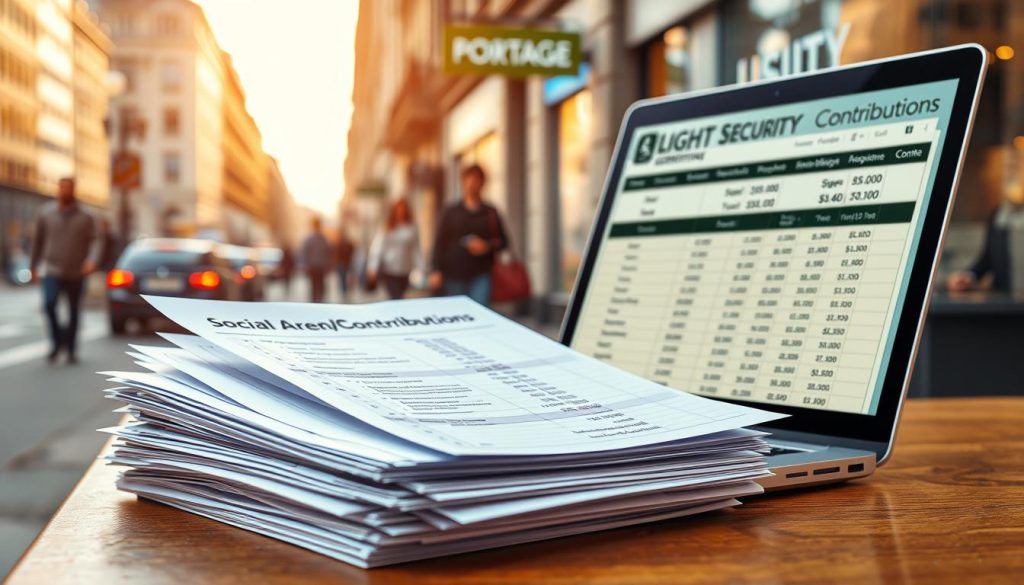As a freelancer in France, managing your financial situation effectively is crucial for a sustainable career. Understanding the taxation system and its implications on your income is a critical aspect of this management.
Navigating the complex landscape of tax obligations as a freelancer can be challenging, but it is essential for making informed decisions about your business structure, financial planning, and retirement.
The French tax system has specific provisions for self-employed individuals, which differ significantly from those for traditional employees. Understanding these provisions early in your freelance career can help you maximize your financial security.
Table of Contents
Key Takeaways
- Understanding your tax residency status is crucial for managing your tax obligations.
- Effective tax planning can significantly impact your financial health as a freelancer.
- The French tax system offers specific provisions for self-employed individuals.
- Managing your tax situation is key to building a sustainable freelance career.
- Early understanding of tax implications can inform your business decisions.
Understanding Tax Residency Status in France
Determining your tax residency status in France is crucial for understanding your tax obligations as a freelancer. Your tax residency status significantly impacts how your income is taxed, making it a foundational aspect of your financial planning.
Criteria for Tax Residency in France
France determines tax residency based on several key criteria. You are considered a tax resident if your permanent home is in France, if you spend more than 183 days per year in the country, if your primary professional activity is based in France, or if your center of economic interests is located there. Understanding these criteria is essential for freelancers to determine their tax obligations.
| Criteria | Description |
|---|---|
| Permanent Home | Having a permanent home in France |
| Time Spent in France | Spending more than 183 days per year in France |
| Professional Activity | Having your primary professional activity based in France |
| Center of Economic Interests | Having your center of economic interests located in France |
Differences Between Resident and Non-Resident Taxation
As a tax resident of France, you’ll be taxed on your worldwide income, subject to applicable treaty exemptions. Non-residents, however, are only taxed on income that originates from French sources. This fundamental difference significantly impacts how freelancers operating across borders should plan their tax strategy.
For freelancers who recently moved to France, understanding your tax residency status and its implications is crucial. Special provisions may apply during your transition period, potentially offering temporary tax advantages worth exploring.
Key Tax Implications for Freelancers in France
Navigating the tax landscape is a critical aspect of a successful freelance career in France. As a freelancer, understanding the tax implications of your work is essential for managing your finances effectively.
Self-Employment Income Categories
The French tax system categorizes self-employment income into three main categories: commercial activities (BIC), non-commercial professional services (BNC), and agricultural pursuits (BA). Understanding these categories is crucial as they determine your tax obligations and available deductions. For instance, most freelance services fall under the BNC category, which applies to independent professionals, consultants, and creative workers.
Taxable vs. Non-Taxable Income
As a freelancer, your income is generally considered taxable unless specifically exempted by law. It’s essential to distinguish between taxable and non-taxable income to comply with tax regulations. The French tax system subjects taxable income from each category to progressive tax rates applicable to resident individuals.
Deductible Business Expenses
Properly identifying deductible business expenses can significantly reduce your taxable income and overall tax burden. Common deductible expenses include professional insurance, workspace costs, equipment, transportation, and continuing education. Accurate tracking and categorization of expenses throughout the year will simplify your tax filing process and help maximize legitimate deductions.
To maximize your deductions, it’s crucial to maintain clear financial records and understand the distinction between personal and business expenses. The French tax system allows for certain income deductions specific to freelancers, creating potential tax advantages for independent professionals.
French Income Tax Structure for Independent Professionals
Understanding the intricacies of France’s income tax structure is essential for freelancers to optimize their financial planning. The French income tax system is characterized by progressive tax rates and a unique family coefficient system, both of which significantly impact the amount of tax owed.
Progressive Tax Rates and Brackets
The French income tax structure follows a progressive system, where higher income levels are taxed at increasingly higher rates. This means that as your freelance earnings increase, so does the rate at which your income is taxed. Currently, France’s progressive tax rates range from 0% for the lowest income bracket to 45% for the highest earners. Understanding the current tax brackets is crucial for freelancers to accurately forecast their tax obligations and budget accordingly throughout the fiscal year.
For instance, if your taxable income falls within the lower brackets, you will be taxed at a lower rate compared to higher income levels. It is essential to plan your freelance activities with an awareness of these tax brackets to optimize your income timing and potentially reduce your overall tax burden.
| Taxable Income (€) | Tax Rate (%) |
|---|---|
| 0 – 10,225 | 0% |
| 10,226 – 26,070 | 11% |
| 26,071 – 74,545 | 30% |
| 74,546 – 160,000 | 41% |
| Above 160,000 | 45% |
Family Coefficient System
France’s tax system also incorporates a family coefficient system, known as « quotient familial, » which can significantly benefit freelancers with families. This system considers household composition when calculating tax liability by dividing the household’s taxable income by a coefficient based on family size. As a result, freelancers with dependents may find themselves in a lower tax bracket, reducing their overall tax burden.
For example, a freelancer with a spouse and two children would have a different coefficient compared to a single individual, potentially lowering their taxable income and thus their tax liability. Understanding how this system applies to your family situation can help in optimizing your tax return.
By comprehending both the progressive tax rates and the family coefficient system, freelancers in France can better navigate their income tax obligations. Accurate record-keeping and awareness of these tax structures are crucial for minimizing tax liability and avoiding potential penalties.
Social Charges and Contributions

As a freelancer in France, understanding social charges and contributions is crucial for managing your finances effectively. Social charges are mandatory payments that fund the French social security system, providing you with essential benefits such as healthcare coverage, retirement benefits, and family allowances.
Understanding CSG/CRDS
The Contribution Sociale Généralisée (CSG) and Contribution au Remboursement de la Dette Sociale (CRDS) are two significant social charges applicable to nearly all types of income, including freelance earnings. These contributions are vital for financing the social security system.
Social Security Obligations for Self-Employed
As a self-employed professional, you are required to contribute to various social security schemes. This includes contributions toward healthcare coverage, retirement benefits, family allowances, and professional training funds. Unlike employees, freelancers bear the full burden of these charges, which can range from approximately 13% to over 40% of your income, depending on your specific regime.
How to Calculate Your Social Charges
The calculation of your social charges depends on your business structure, professional category, and annual income level. Different rates apply to different income thresholds, making it essential to understand how to properly calculate and budget for these charges to maintain positive cash flow in your freelance business.
To illustrate how social charges are calculated, consider the following example:
| Income Threshold (€) | Social Charge Rate (%) | Total Social Charges (€) |
|---|---|---|
| 0 – 45,000 | 13% | 5,850 |
| 45,001 – 70,000 | 20% | 9,000 |
| Above 70,000 | 40% | 28,000 |
For more information on choosing the right business structure and understanding your social security obligations, you can visit this resource to help you make informed decisions.
Navigating Wealth and Property Taxes
The journey to financial stability as a freelancer in France involves understanding and managing wealth and property taxes. As your business grows, so does the complexity of your tax obligations. Beyond income taxes and social charges, successful freelancers must also consider the impact of wealth and property taxes on their assets.
Impôt sur la Fortune Immobilière (IFI)
Effective from January 1, 2018, the real estate wealth tax, known as Impôt sur la Fortune Immobilière (IFI), replaced the traditional wealth tax. This tax applies to individuals with total net real estate assets exceeding €1,300,000 as of January 1. The IFI is levied on all real estate assets, including those held directly or indirectly through companies or other investment vehicles.
The IFI uses a progressive rate structure ranging from 0.5% to 1.5% based on the total value of qualifying real estate assets, with the first €800,000 exempt from taxation. For instance, if your net real estate assets are valued at €1,500,000, the taxable amount would be €700,000 (€1,500,000 – €800,000). The applicable tax rate would be 0.7%, resulting in a tax liability of €4,900.
| Net Real Estate Assets (€) | Tax Rate (%) | Tax Liability (€) |
|---|---|---|
| 0 – 800,000 | 0 | 0 |
| 800,001 – 1,300,000 | 0.5 | 2,500 |
| 1,300,001 – 2,570,000 | 0.7 | 8,890 |
| 2,570,001 – 5,000,000 | 1.0 | 24,300 |
| > 5,000,000 | 1.5 | – |
Capital Gains Tax on Business Assets
Capital gains tax on business assets is another critical consideration for freelancers, particularly when selling business property or transferring ownership of their practice. The French capital gains tax system offers certain exemptions and reductions based on the holding period of assets, creating potential tax planning opportunities for long-term business investments.
« The key to minimizing capital gains tax lies in understanding the exemptions and reductions available based on the holding period of your business assets. »
For example, if you sell your business property after holding it for more than 10 years, you may be eligible for a reduced capital gains tax rate. Proper planning and understanding of these provisions can significantly impact the after-tax proceeds from selling your business or professional practice.
Tax Filing and Payment Procedures for Freelancers

Understanding tax filing and payment procedures is crucial for freelancers in France to maintain compliance and avoid penalties. The French tax system has specific requirements that freelancers must adhere to, including various tax declarations and payment schedules.
Required Tax Declarations
As a freelancer in France, you are required to file several tax declarations annually. These include your personal income tax return (déclaration des revenus) and a professional declaration specific to your business category. The type of professional declaration you need to file depends on your business structure—whether you’re categorized under BIC (profits from industrial and commercial activities) or BNC (non-commercial profits).
The personal income tax return requires you to report all your income from various sources, including your freelance work. Ensuring that you have all necessary documentation, such as invoices and expense records, is crucial for accurately completing your tax declarations.
Payment Schedules and Deadlines
The French tax system operates primarily through a withholding tax mechanism for certain types of income. However, for freelancers, this means making advance payments (acomptes provisionnels) based on the previous year’s income. These payments are typically collected monthly or quarterly directly from your French bank account.
It’s essential to maintain sufficient funds in your account to cover these automatic withdrawals. Key filing deadlines for tax returns occur annually in May or June for paper returns and slightly later for online declarations. The exact dates may vary depending on your department and the method of filing.
Penalties for Late Filing or Payment
The French tax administration imposes significant penalties for late filing or payment, starting at 10% of the taxes due. Additional interest charges may apply for extended delays, making it even more critical to adhere to the payment schedules and deadlines.
To avoid these penalties, setting up a dedicated business account and implementing systematic record-keeping practices can significantly simplify your tax compliance obligations. First-time filers should be particularly mindful of their cash flow management, as they will need to make both current year payments and advance payments for the following year.
Tax Planning Strategies for Freelance Professionals
Freelancers must adopt effective tax planning strategies to minimize their tax burden and ensure long-term financial stability. In France, the complexity of tax regulations can be challenging, but with the right approach, freelancers can optimize their financial situation.
One crucial aspect is choosing the optimal business structure for your freelance activities. Options range from the simple micro-entrepreneur regime to more complex corporate structures like EURL or SASU. Each structure has different tax implications, social security contribution rates, and liability protections that should be evaluated based on your specific professional situation and income level.
Business Structure Considerations
Selecting the right business structure is fundamental to tax planning. For instance, the micro-entrepreneur regime offers simplicity but may not be suitable for high-income earners due to its fixed tax rate. In contrast, structures like EURL or SASU provide more flexibility in terms of tax deductions and social contributions but require more complex accounting.
| Business Structure | Tax Implications | Social Security Contributions |
|---|---|---|
| Micro-Entrepreneur | Fixed tax rate | Simplified contributions |
| EURL/SASU | More flexible tax deductions | Variable contribution rates |
Assurance-Vie as a Tax Planning Tool
The French assurance-vie (life insurance) is a tax-efficient investment vehicle that offers favorable taxation on gains and significant inheritance tax advantages. When properly structured, it can provide tax-deferred growth and flexible withdrawal options, making it valuable for freelancers with irregular income patterns.
For more information on optimizing your financial planning, you can visit this resource on income simulation tools.
Retirement Planning and Tax Benefits
Retirement planning is crucial for freelancers who don’t benefit from employer pension contributions. Several tax-advantaged options are available, including complementary pension plans (PER) that offer immediate tax deductions. Strategic timing of income recognition and expense deductions across tax years can also help smooth out tax liabilities.
Conclusion: Taking Control of Your Freelance Tax Situation
The French tax system presents both opportunities and challenges for freelancers, making tax planning essential. As we’ve explored throughout this article, understanding your tax residency status, income categorization, and available deductions is crucial for optimizing your tax situation.
By taking control of your freelance tax situation, you can significantly improve your financial position. This involves ongoing education, proactive planning, and sometimes seeking professional guidance to navigate France’s complex tax landscape. The progressive income tax rates, social security obligations, and wealth tax considerations require careful attention.
To achieve tax efficiency, consider reviewing your tax situation annually with a qualified tax professional. This will help identify new optimization opportunities as regulations change. As your freelance career evolves, your tax planning strategies should adapt accordingly.
Key Takeaways:
- Understand your tax residency status and its implications.
- Properly categorize your income and maximize legitimate deductions.
- Implement strategic tax planning to improve your financial position.
- Establish good record-keeping habits to simplify tax filing and gain insights into your business performance.
By adopting a proactive approach to tax management, you can focus on delivering exceptional value to your clients and building a rewarding independent career. Effective tax planning is not just about compliance; it’s about creating a sustainable financial foundation for your future.
FAQ
What determines my tax residency status in France?
Your tax residency status in France is determined by factors such as your presence in the country, the location of your primary residence, and your professional and personal ties. If you spend more than 183 days in France within a 12-month period, you are generally considered a resident for tax purposes.
How do I report my self-employment income for tax purposes?
As a freelancer, you must report your self-employment income on your tax return. You will need to categorize your income and claim deductible business expenses to minimize your taxable income. You can find more information on the required tax declarations on the French tax authority website.
What is the difference between CSG and CRDS?
CSG (Contribution Sociale Généralisée) and CRDS (Contribution pour le Règlement de la Dette Sociale) are social charges levied on your income. CSG is a general social contribution, while CRDS is a contribution aimed at paying off the social debt. Both contributions are used to fund social security and other social programs.
How do I calculate my social charges as a self-employed individual?
To calculate your social charges, you will need to determine your net earnings from self-employment and apply the relevant social charge rates. You can find the applicable rates and calculation methods on the relevant social security website or consult with a professional advisor.
What is the Impôt sur la Fortune Immobilière (IFI), and how does it affect me?
The IFI is a tax on real estate wealth. If you own significant real estate assets, you may be subject to this tax. You will need to report your real estate assets and pay the corresponding tax if your net wealth exceeds the threshold.
What are the penalties for late filing or payment of taxes?
If you fail to file your tax return or pay your taxes on time, you may be subject to penalties and interest charges. The penalties can be significant, so it’s essential to comply with the tax filing and payment deadlines.
How can I minimize my tax liability as a freelancer?
You can minimize your tax liability by optimizing your business structure, taking advantage of deductible business expenses, and utilizing tax planning strategies such as Assurance-Vie. It’s recommended that you consult with a professional advisor to determine the best approach for your situation.
What is the Family Coefficient System, and how does it impact my tax rate?
The Family Coefficient System is a mechanism that adjusts your tax rate based on your family situation. The system takes into account the number of dependents and adjusts your taxable income accordingly, which can result in a lower tax rate.





